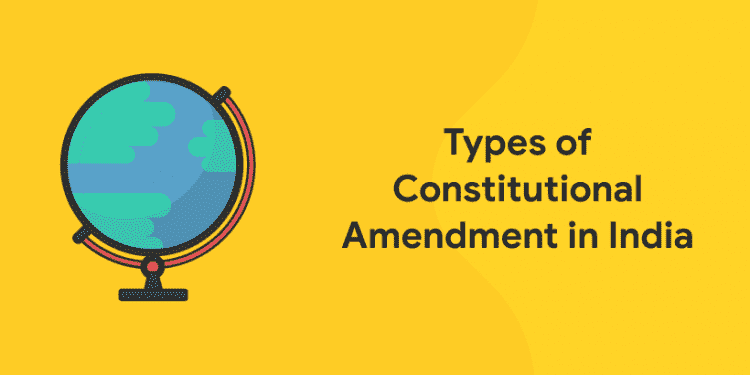The Indian Constitution is the highest law of India. India is also known as Bharat, which is a Union of States. It is a Sovereign Socialist Secular Democratic Republic with a parliamentary system of government. An amendment is a formal or official change made to a law, contract, constitution, or any legal document. The amendments can be added, removed, or update any of the parts of the agreements. By 2020 January, there are 104 amendments of the constitution of India, and it was first enacted in 1950. This article deals with the topic – Types of Constitutional Amendment in India.
Start your exam preparation with Entri
Types of Constitutional Amendment in India
Article 368 in Part XX of the Indian Constitution deals with the powers of Parliament to amend the Constitution and its procedure. It states that the Parliament may, in exercise of its constituent power, add/remove an article, repeal any provision of the Constitution. But no change can be done in the basic structure of the constitution. There are three types of amendments according to the Indian Constitution. They are:
- Amendment by simple majority of the parliament.
- Amendment by special majority of the parliament.
- Amendment through special majority of the parliament and the ratification of half of the state legislatures.
Check out each amendments and its provisions for better understanding.
By Simple Majority of Parliament
Many provisions in the Indian Constitution can be amended by a simple majority of the two Houses of Parliament (Rajya Sabha and Lok Sabha) outside the scope of Article 368. These provisions include:
- Admission or establishment of new states.
- Formation of new states and alteration of areas, boundaries or names of existing states.
- Abolition or creation of legislative councils in states
- Second Schedule—emoluments, allowances, privileges and so on of the president, the governors, the Speakers, judges, etc.
- Quorum in Parliament
- Salaries and allowances of the members of Parliament
- Rules of procedure in Parliament
- Privileges of the Parliament, its members and its committees
- Use of English language in Parliament
- Number of puisne judges (denoting a judge of a superior court inferior in rank to chief justices) in the Supreme Court
- Conferment of more jurisdictions on the Supreme Court
- Use of official language
- Citizenship – acquisition and termination
- Elections to Parliament and state legislatures
- Delimitation of constituencies
- Union territories
- Fifth Schedule – administration of scheduled areas and scheduled tribes
- Sixth Schedule – administration of tribal areas
Download Entri app for free and ace your GK
By Special Majority of Parliament
The majority of the provisions in the Constitution need to be amended by a special majority of the Parliament, that is, a majority (which is, more than 50 percent) of the total membership of each House and a majority of two-thirds of the members of each House present and voting. The expression ‘total membership’ means the total number of members comprising the House irrespective of fact whether there are vacancies or absentees.
The actuality is that the special majority is required only for voting at the third reading stage of the bill but by way of abundant caution the requirement for special majority has been provided for in the rules of the Houses in respect of all the effective stages of the bill.
The provisions which can be amended by this way include:
- Fundamental Rights
- Directive Principles of State Policy (Articles 36-51 under Part-IV of Indian Constitution deal with Directive Principles of State Policy (DPSP). They are borrowed from the constitution of Ireland which had copied it from the Spanish Constitution.)
- All other provisions which are not covered by the first and third categories.
Attempt daily quizzes on Entri for free
By Special Majority of Parliament and Consent of States
Those provisions of the Constitution which are related to the federal structure of the polity can be amended by a special majority of the Parliament and also with the consent of half of the state legislatures by a simple majority. If one or some or all the remaining states take no action on the bill, it does not matter; the moment half of the states give their consent, the formality is completed. There is no time limit within which the states should give their consent to the bill.
The following provisions can be amended in this way:
- Election of the President and its manner.
- Extent of the executive power of the Union and the states.
- Supreme Court and high courts.
- Distribution of legislative powers between the Union and the states.
- Any of the lists in the Seventh Schedule.
- Representation of states in Parliament.
- Power of Parliament to amend the Constitution and its procedure (Article 368 itself).
Constitutional Amendment Process
The procedure for the amendment of the Constitution as laid down in Article 368 is as follows:
- An amendment of the Constitution can be initiated only by the introduction of a bill for the purpose in either House of Parliament (Lok Sabha & Rajya Sabha) and not in the state legislatures.
- The bill can be introduced either by a minister or by a private member and does not require prior permission of the president.
- The bill must be passed in each House by a special majority, that is, a majority (that is, more than 50 per cent) of the total membership of the House and a majority of two-thirds of the members of the House present and voting.
- Each House must pass the bill separately.
- In case of a disagreement between the two Houses, there is no provision for holding a joint sitting of the two Houses for the purpose of deliberation and passage of the bill.
- If the bill seeks to amend the federal provisions of the Constitution, it must also be ratified by the legislatures of half of the states by a simple majority, that is, a majority of the members of the House present and voting.
- After duly passed by both the Houses of Parliament and ratified by the state legislatures, where necessary, the bill is presented to the president for assent.
- The president must give his assent to the bill. He can neither withhold his assent to the bill nor return the bill for reconsideration of the Parliament
- After the president’s assent, the bill becomes an Act (i.e., a constitutional amendment act) and the Constitution stands amended in accordance with the terms of the Act.
The students who all are preparing for different exams can read this article for understanding the Types of Constitutional Amendment in India. Learn with Entri app for more study materials for various exams. Good luck for all the aspirants.













